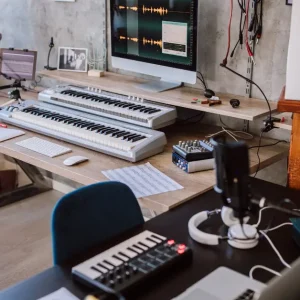The piano traces its origins all the way back to the 11th century Middle East through the dulcimer, a simple resonating box with strings stretched on top of it. Since then, the instrument evolved from the clavichord to the harpsichord and, in 1700, the world’s first piano.
But throughout the history of music, the benefits of playing piano for your mind, body, and soul have remained constant.
Here’s a look at some of the biggest benefits of piano playing for the brain, the body, and your whole life.
1. Prevents Processing, Hearing, and Memory Loss

What if we said that piano benefits your brain—even when you’re old and gray?
Typically, our ability to process sound declines as we age. This is part of why we lose our hearing over time. But according to a 2012 study by the Auditory Neuroscience Laboratory at Northwestern University in Evanston, Illinois, playing music throughout your life can actually protect your brain and even reverse the decline of brain processing, inner ear hearing loss, and memory.
In the study, researchers attached electrodes to the heads of 87 participants between 18 and 65 with normal hearing. Half started music lessons before the age of nine and remained active throughout their lives, while the remaining half had three years or less of music lessons.
Older musicians who made music a part of their lives could process auditory signals just as fast as younger musicians, while non-musicians lagged behind. And listening is not enough—playing is the key ingredient, training your brain to pluck important information from the surrounding soundscape.
2. Boosts Neuroplasticity and Abstract Reasoning
This is in part because of piano’s impressive power to strengthen your brain’s neural plasticity. Neural plasticity is the nervous system’s capacity to functionally and structurally modify itself in response to experience and injury. This is what allows us to learn new things and adapt to new environments over time.
When we’re babies and children, our brains are incredibly adaptable. It all comes down to synaptic connections, which are easily formed when we’re young because our brains are still growing and developing. But our brains operate on a use it or lose it system, which is how our brain allows us to do away with connections we don’t need in favor of more useful connections.
What’s interesting is that playing piano activates parts of the brain associated with abstract reasoning—after all, humans are sight animals, and piano is sound. That’s incredibly important for neuroplasticity since piano triggers parts of the brain associated with speech, memory, and abstract thinking, which allows us to take those abstract skills to other areas of our lives.
3. Encourages Creativity
This one should be obvious, but it’s still worth repeating: playing piano is a phenomenal way to encourage your creativity!
Many people discard playing the piano without ever trying because they don’t consider themselves musical. While it is true that some people’s brains are better adapted to learning music, playing the piano always relies on the same complex network of brain regions. One of these is the dorsolateral prefrontal cortex, a brain area previously linked to suppression of stereotypical responses and the selection of improvised actions—in other words, thinking outside the box.
For inexperienced pianists, this network is actually more active than experienced pianists when you’re asked to play anything you like. This is what creates the higher functional connectivity that allows experienced pianists to improvise and create new music. In plain English? You’re literally training your brain to be creative.
Don’t believe it? Just look at jazz pianists, famous for the improvisation that makes their art so magical. According to a study by the National Library of Medicine, when a jazz pianist plays, the part of their brain responsible for default and stereotypical responses is actually suppressed so that the brain can prioritize improvisational ability. And as you practice using your brain this way over time, you strengthen those connections.
4. Boosts Self-Esteem
In the process of brain training, you’re also teaching yourself confidence—and there’s science to back it up.
In a 2014 study of fourth-grade public school students in Canada, 63 students who had never participated in formal music instruction and had no piano at home received individual piano lessons every week for three years and provided an acoustic piano at no cost to their families, while 54 students did not participate in music instruction. They were then given periodic tests of self-esteem, academic achievement, cognitive abilities, musical ability, and motor proficiency.
Students who participated in formal piano lessons saw positive results in their self-esteem as well as their academic performance. Researchers believe this was a result of the excitement of gaining proficiency and mastery in a new instrument.
6. Alleviates Depression and Anxiety
Is it any surprise, then, that piano lessons can actually help boost your mood?
A 2013 study by the National Library of Medicine following older adults saw a significant improvement in mood indicators, including depression and anxiety, in the experimental group which received piano lessons and daily training for four months. While this suggests a positive intervention for older adults, it also has significant implications for younger students too. Remember, your brain relies on the same networks regardless of age.
Want to Take Advantage of the Benefits of Playing Piano
Want to take advantage of the many exciting benefits of playing piano? We can’t blame you!
It all starts with finding the best piano lessons. And that’s where we can help, with expert teachers, a driving focus on our students, and a proven approach to help you get the most of your music experience. So if you’re ready to change your life through music (or at least give yourself a little bit of joy each week) be sure to enroll in classes today.








